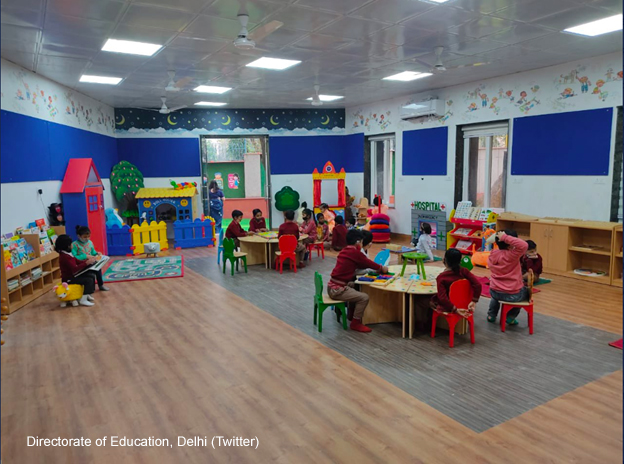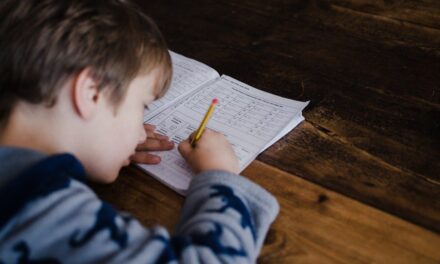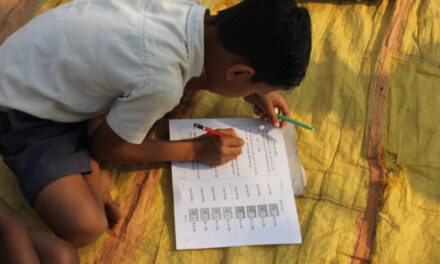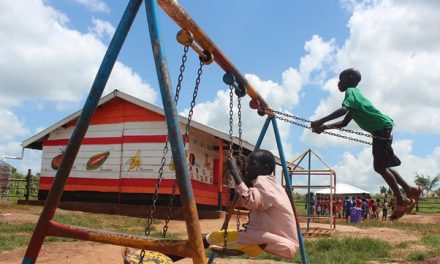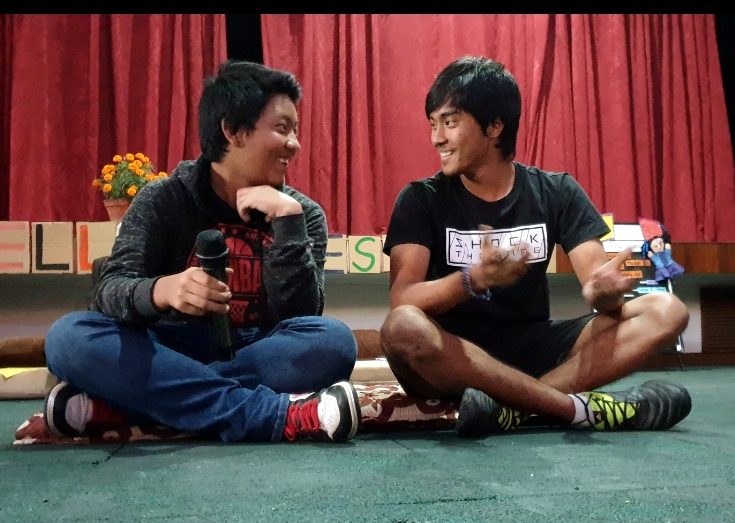This blog was written by: Himanshu Gupta (IAS), Director of Education and Sports, Directorate of Education, and Shreyan Acharya, Change-Maker in Education Fellow, Government of National Capital Territory (NCT) of Delhi.
The 8th of March 2022 marked a new dawn in the history of government schools in Delhi, especially at the primary level, as the Montessori Lab was launched in a government-run school for the first time. The ideals of Maria Montessori focusing on the growth of the ‘whole child’ found a renewed vigour. This blog reviews the early stages of the Lab implementation and assesses its benefits for Early Childhood Care and Education (ECCE) across the sector.
As a result of a stronger focus on ECCE in the National Education Policy 2020 in India, the Government of Delhi incorporated the first-of-its-kind Montessori Lab in a Delhi Government School. The National Education Policy focuses more strongly on play-based, activity-based and inquiry-based learning. The pilot Montessori Lab aims to enhance the Policy through the Montessori philosophy as a blended form where students spend time complementing their daily engagements with play. Although this ‘Whole Child Development’ approach is a big shift from the instructional model, the idea is to encourage students to think along the lines of “today I am going to play in school”.
Establishing the Montessori Lab has set a benchmark in the educational governance process to revise ECCE in different forms where there are grave challenges and limitations. The approach is further emboldened as it is being scaled up to 100 different government schools, where children belonging to different socio-economic backgrounds will gain the benefits previously accessed by a privileged few. This education governance model adopts a forward-looking approach for accelerating the goals under Sustainable Development Goal 4 by ensuring inclusive and equitable quality education. This has achieved a milestone in setting a precedent for strengthening primary education by revitalising innovative methods as an opportunity in the midst of the challenging pandemic.
Montessori model for enhancing ECCE
The emphasis in the National Education Policy on play-based learning for ECCE is strengthened through the unique approach of establishing a Montessori Lab for children at pre-primary and primary levels. The whole-child development approach attempts to promote uniqueness in every child through the freedom to choose the tool the child wants to engage with, while also learning the skills of self-corrective methods. The teacher becomes more of an observer than an instructor, who would let the child be a self-learner rather than focusing on correcting the mistakes. It is also important to note that the Montessori Lab complements the theory of an absorbent mind propagated by Maria Montessori, as it is crucial in the early stages of life for children to adapt and learn from their environment. The independence to learn with the freedom of movement and hands-on experience gives a child broader autonomy, nurturing the development of the whole child through social, physical, emotional and intellectual development.
Relevance of the Montessori Lab in a government school
Different objectives are collectively fulfilled by establishing the Montessori Lab in a government school in Delhi. These objectives aim to make education more inclusive for children of all socio-economic backgrounds:
Bridging the gap between government-run schools and public/private schools: Play-based resources have always been considered tools for the privileged, and different privately-run schools across Delhi have these facilities. The Montessori Lab provides children of a government-run school with tools and resources that focus on play-based learning.
Reviving the Montessori methods in the post-pandemic education system: The pandemic has caused a significant setback in educational attainment. Considering the whole-child framework, incorporating the Montessori methods through a blended form is an approach to reinvigorating play- and activity-based learning to fill gaps caused during school closures. These gaps are not restrictive from an academic perspective. The approach toward filling the gaps also aims to achieve social, emotional, cognitive, physical and psychological growth.
Incentivising students to bring them back to schools: The pandemic has caused an immense impact on the regular school system. Providing state-of-the-art infrastructure is a way of promoting the thinking process of in-person schooling as compared to online education. Moreover, to encourage play and activity-based learning where students are active learners, the Montessori Lab plays a crucial role in promoting the philosophy where children say “today I am going to play in school”. This philosophy embeds a hidden message of creating innovative ways of learning, starting from the foundational or pre-primary and primary levels.
Moving away from digital tools to encourage social interactions: Technology is a tool that makes life easier, but complete reliance on it can be detrimental to human values. Due to the pandemic, many children have been deprived of seeing the school at all. Their first friend would probably be a mobile phone/laptop. Therefore, to build social interactions and move away from the reliance on digital tools, the Montessori model in its new approach has the potential to fulfil this purpose. The children in the Lab would gain hands-on experience in learning through different tools. The essence lies in direct human contact, enhancing sound fine and gross motor skills, and building social interactions through peer learning.
Creating a sense of autonomy and agency amongst children to be active learners: The role of the teacher is to make keen observations shifting from instruction-based teaching. The freedom to learn and engage actively contributes to the whole-child development. The philosophy of Maria Montessori is revived to blend the model according to the requirements and limitations of a Delhi government school.

